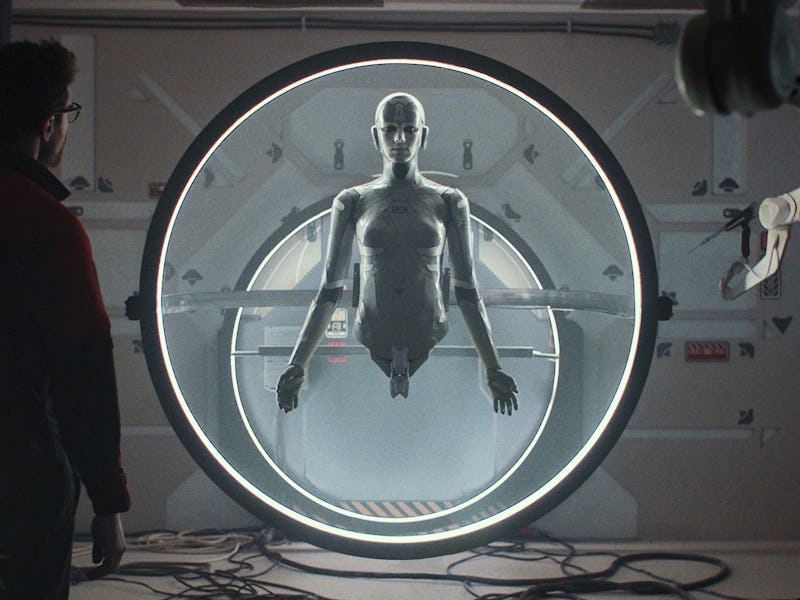Archive is a gorgeous new sci-fi movie with a gut-punch twist
Gavin Rothery's directorial debut takes a familiar science fiction concept and gives it a new face. Several faces, in fact.

There is something endearing about a clunky robot with its boxy head and limbs walking around trying to be helpful. It's the same magic that made us fall in love with C-3PO and R2-D2. But beware when it comes to Archive. Whatever affection you have toward its mechanical characters only leads to heartbreak in a well-executed twist ending.
Archive, releasing by video-on-demand on July 10 from freshman director and veteran concept artist Gavin Rothery, is a breath of fresh air for indie science fiction. Gorgeously designed and imagined, Archive is a long-distance love story that ponders the authenticity of a soul, and — without giving too much away — questions whether we have any right to disrupt the natural order of life and death. It is a deceptive movie, too. One that warms the heart before dousing it in ice water.
In 2038, inside a lonely laboratory besieged by a snowy forest, George (Theo James) races against a deadline for a breakthrough experiment in creating a true, human-equivalent artificial intelligence. But as his experiments get riskier, George hides his true goal from his superiors: reviving his dead wife (Stacy Martin) by using her archived, digitized consciousness.
Visually and tonally reminiscent of numerous works — Ridley Scott's Alien, Masamune Shirow's Ghost in the Shell, Alex Garland's Ex Machina, and Duncan Jones' Moon (a film Rothery was heavily involved in conceptualizing) all come to mind — Archive establishes its own identity with a self-contained story exploring one primary idea: Death is not the end of life. In the world of Archive, it is possible to "archive" one's consciousness ... for a limited time.
Stacy Martin (left) and Theo James (right) in 'Archive'.
It's a common science fiction trope, the transferring of minds into technology (often coded as the "soul"), but Archive excels in telling this one idea and one idea alone. The life-preserving technology is limited compared to other recent stories like Amazon's Upload. Instead of a simulation, the deceased stay in a high-tech square box, like a phone booth or a sophisticated Redbox. Immediately, the film questions how defying death with science can be unnaturally cruel.
Theo James, whose protagonist George resembles a reboot of Dr. Frankenstein, plays a stressed-out creator/guardian of two (later three) robotic creations: "J1," a prototype as big and square as a washing machine; "J2," a more mobile model with stifled speech and complex feelings; and "J3," George's final creation, a humanoid robot more human than human. The latter two are both played by a sharp Stacy Martin, who pulls in triple duty as two different androids and the dead wife in our protagonist's perfect memories.
Between the drama of J2's jealousy and J3's crisis, Archive is a stunning emotional and visual feast. Watching these robots is hypnotic (a practical effect — it's people in costumes!) as James and Martin act their butts off. A lesser actor than James would have struggled with faceless co-stars, while a lesser actor than Martin could never flesh out synthetic characters you feel for. One moment late in the film, when J2's limbs are given up for J3, J2's abandonment is palpable thanks to Martin's expressive voice. Even through the cold exterior of J2's "face," you know what J2 feels because you feel it too. When J2 topples over, you topple too.
Stacy Martin as "J3" in 'Archive'.
From set design to cinematography, Archive is a top-notch production. But it's because of the competency of its two leads that Archive maintains course and avoids disastrous derailment.
There are minor hiccups indicative of a first-time director in Rothery. It is maybe 20 minutes too long, and the movie's villain get a little too Saturday morning cartoon for this otherwise grounded world. Quite a bit, you'll see bad guys accompanied by armed soldiers making threats over computer screens like it's G.I. Joe.
But all of Archive comes together in the end with a twist ending powerful enough to suck the air from your lungs. Predictable? Maybe. Effective? Hell yes. Whether the ending makes Archive a future cult classic or a wedge that polarizes audiences, it is indisputable how effective and airtight it is.
As 2020 ticks down and fewer new movies are released in a pandemic, Archive comes at a fitting if not harrowing time. Locked away from most of the world (or at least we should be), you may have spent a lot of time chewing on far-out ideas about existence. So it's fitting that even if Archive isn't a big movie, it still asks big questions about the nature of being. That it does so with breathtaking science fiction sheen and a legitimately novel and clever ending makes this movie feel truly alive.
Archive will be released on VOD on July 10.
Update: A previous version of this article incorrectly attributed the anime film Ghost in the Shell to filmmaker Katsuhiro Otomo. The director was Masamune Shirow. This review has been updated accordingly.